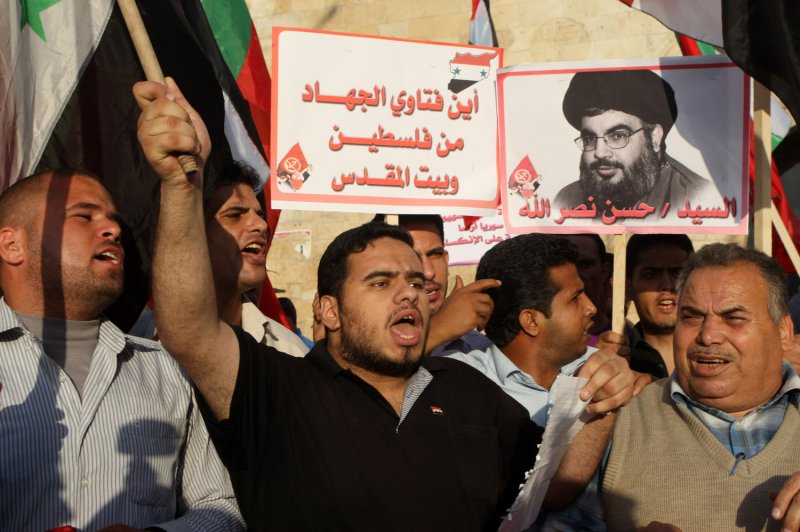Palestinian supporters of the Popular Front for the Liberation of Palestine (PLFP) wave the group's red flag, the Syrian flag, and hold posters of Lebanon's Hezbollah leader Sheikh Hassan Nasrallah, during a rally, on May 7, 2013. The Israeli attack on Syria in Khan Yunis, a town in the southern Gaza Strip sent regional tensions soaring. "Israel is not getting involved in Syria's civil war." Defence Minister Moshe Yaalon stated just days after two Israeli air strikes near Damascus. UPI/Ismael Mohamad |
License Photo
Three Lebanese soldiers were killed today, as a car bomb hit an army checkpoint outside Arsal, Lebanon, near the Syrian border. Several more soldiers were reported injured.
"A booby-trapped car exploded at an army checkpoint in al-Aqaba region at the outskirts of Arsal,” the state run National News Agency reported.
Tensions have been high along the dividing line between Syria and Lebanon, as Syrian refugees continue to flood across the border to escape the violence. More than a million Syrian refugees are already in Lebanon. It's a humanitarian crisis that has apparently overwhelmed the aid capacity of international organizations, and that experts say threatens to destabilize an already fragile country.
Several Syrian towns in the mountains near the border -- previously rebel strongholds -- were reported to have been retaken by President Bashar al-Assad's government forces, threatening to disrupt vital rebel supply routes from eastern Lebanon.
"The Army and Armed Forces restored stability and security to the towns of Ras Maara and Flita ... after getting rid of the fleeing terrorists and destroying their weapons," state news agency SANA claimed.
No one has yet taken responsibility for the suicide bombing, but early reports from the BBC suggest that a Sunni Muslim militant group was behind the attack. Lebanese soldiers have been accused by several Sunni groups of being too close to Shia militant group Hezbollah, who has been offering supplies and support to Syrian forces.
[BBC News]
[Al Arabiya News]
[Huffington Post]
[Naharnet News]















